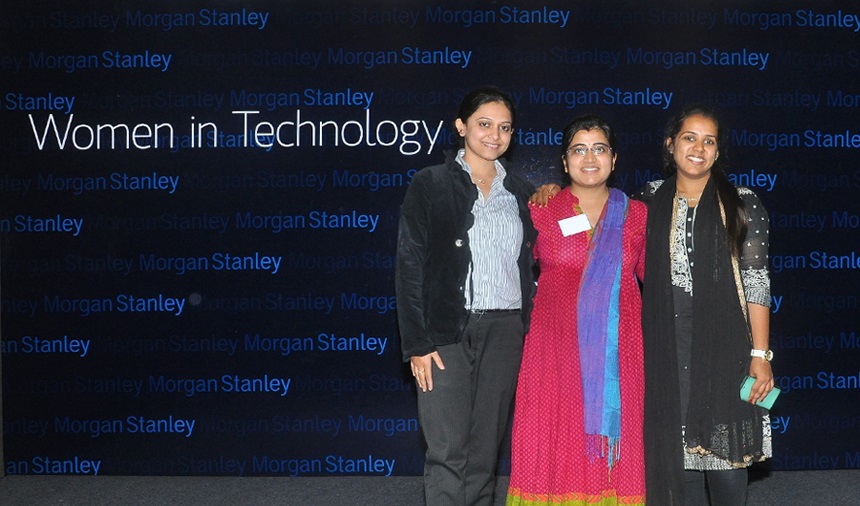Discover how Morgan Stanley’s first women-only code-a-thon in India is tapping a new generation of female software talent for the best jobs.
Early on a Saturday morning this August, 75 Indian women, all in their twenties, excitedly gather in the ballroom of the Bengaluru Aloft Hotel. It’s not dancing that’s creating the buzz, but the prospect of spending the next nine hours hunched over their laptops, bingeing on code.
For today’s Indian women, software engineering is a hot career choice—a path to equal pay and a place where they’re on an equal footing with men when it comes to nailing jobs out of college.
“I’m very passionate about coding, I love these challenges—I used to do coding competitions all the time at college,” explains 25-year-old Lubna Karody, as she zeros in on two other women to set up a crack team of programmers.
“Focused on Coding”
Karody is standing among some of India’s best and brightest software engineers, hand-picked by Morgan Stanley from more than 600 applicants for its first women-only code-a-thon in Bengaluru (also known as Bangalore). Most of them already have good jobs with top technology firms, but they’re anxious to show off their coding chops to a global financial firm.
The women form 25 teams of three, and sit two teams to a table. Each team chooses one of six brain-twisting coding projects applicable to the finance sector, all of which look impossible to finish under a week, let alone in a day. Conspiratorial whispering and the rapid clatter of fingers over keyboards is all that’s heard, as the contest begins.
“They were so completely focused on coding that, at lunch, we had to call out to the women about three or four times before they would take a break,” says Kavita Kulkarni, Chief Operating Officer of Wealth Management and Investment Management Technology at Morgan Stanley.
“Technology is definitely a preferred field for women in India,” says Sonam Rastogi, one of Karody’s partners. “The pay is good, it’s secure, and if you can get a job at a firm like Morgan Stanley, the benefits for women are very good.”

More Women in Tech
Only a few years ago, Morgan Stanley might have struggled to find enough candidates for an all-female coding event. “When I was a kid, my sisters and cousins became teachers and my brothers went into commerce,” says Rastogi. “But by the time I grew up, things had changed. Families are now very willing to send their daughters to other cities to attend engineering school.”
Rastogi, Karody and their other code-a-thon partner, Sneha Thakur, respectively, is each the first daughter in her immediate family to study computer science.
The growth of India’s hottest industry has helped drive the change. Tech industry revenues in the country are expected to grow by more than 13% in full-year 2015 to $146 billion, from $130 billion in 2014, according to India’s National Association of Software and Services Companies.
Global tech firms and investment banks, such as Morgan Stanley, have also contributed to the rush of women into the field by bringing their well-entrenched global diversity programs to India, which have raised the stakes for recruiting female talent.
“Innovation is key to staying ahead in the game, and diversity generates ideas,” says Chakra Mantena, Head of Technology for Morgan Stanley in Bengaluru. “That’s why we are trying to recruit top female talent.”
Traditional Pressures
In India, the industry as a whole now offers women many more benefits. The most coveted benefits help them deal with family and social pressures to abandon their careers to stay at home once they have kids. This expectation breeds all sorts of biases in the workplace.
Often, women who started out on par with men, begin to lag behind after a few years. “We seem to keep up [with men] at first, but then after we have children, a lot of times you see people drop out,” says Rastogi. “Sometimes men will be promoted ahead of women because there are expectations that the woman will soon be having children.”
A Study of the Indian tech industry by nonprofit research organization Catalyst, found that while entry-level jobs seem to be evenly dispersed among men and women in technology, a gender gap emerges once women marry and have children, both in terms of salary levels and seniority.
Firms can help level the playing field. Longer maternity leave, more flexible working hours and guaranteed safe transport in the tech industry are commonplace. Increasingly, firms also provide daycare. To help with re-acclimating after maternity leave, Morgan Stanley and others offer retraining and mentorship.
Stars of Coding
By the end of the day, Karody, Rastogi and Thakur, can show an operating Option Expiration Website for institutional clients, which offers a range of automated calculations and notifications on what positions were in and out of the money. The projects were designed to be difficult, so that the judges could easily pick out the stars.
There were many. Nearly a third of the women who participated in this first code-a-thon were invited back to interview for jobs at Morgan Stanley, including Karody, Rastogi and Thakur.
“It was a great success,” says Satish Kamath, Head of Operations & Compliance Technology (India) at Morgan Stanley. “We would look at repeating a similar event in Mumbai, now.”










